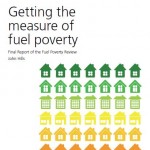 March 2012: The final report from Prof. John Hills has just been published, which provides a series of recommendations to Government in relation to amending the current definition of fuel poverty. The detail behind this study has been covered in some previous posts (see here) but a key output is to recommend that “Government should measure incomes for fuel poverty purposes after housing costs and adjusted for household size and composition.” As a result, the report’s revised indicator (to replace the Government’s current fuel poverty definition) – the LIHC (Low Income High Costs) – “finds that London households account for a greater proportion of fuel poor households than the official indicator.”
March 2012: The final report from Prof. John Hills has just been published, which provides a series of recommendations to Government in relation to amending the current definition of fuel poverty. The detail behind this study has been covered in some previous posts (see here) but a key output is to recommend that “Government should measure incomes for fuel poverty purposes after housing costs and adjusted for household size and composition.” As a result, the report’s revised indicator (to replace the Government’s current fuel poverty definition) – the LIHC (Low Income High Costs) – “finds that London households account for a greater proportion of fuel poor households than the official indicator.”
The report is vitally important to the debate on how we define future policies to tackle fuel poverty, and will have impacts on framing of the forthcoming Energy Company Obligation (ECO) and the Green Deal.
Links to the report and supplementary material follow below:
- Final report of the Fuel Poverty Review by John Hills – Getting the measure of fuel poverty and also the
- Hills Review Final Report Press Notice
- DECC’s press notice
- Getting the measure of fuel poverty: summary and recommendations
- Data used to produce charts for the final report of the Fuel Poverty Review (Excel file)
- Professor Hills’ presentation on the final report: Getting the measure of fuel poverty (Powerpoint – 5MB)

